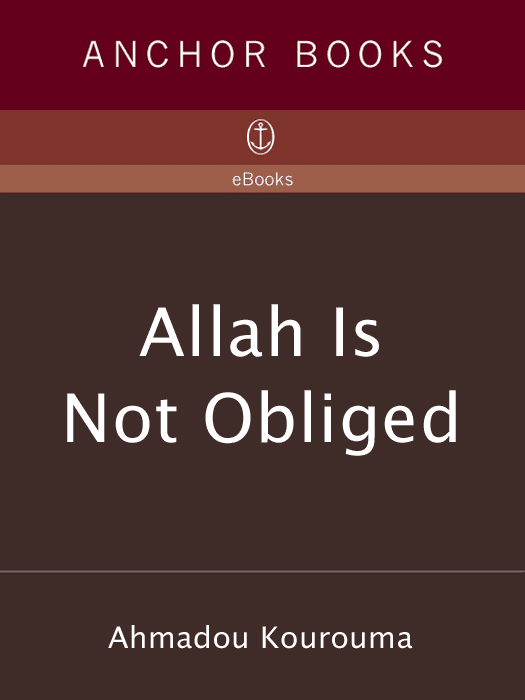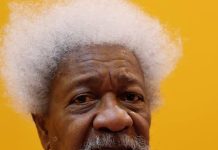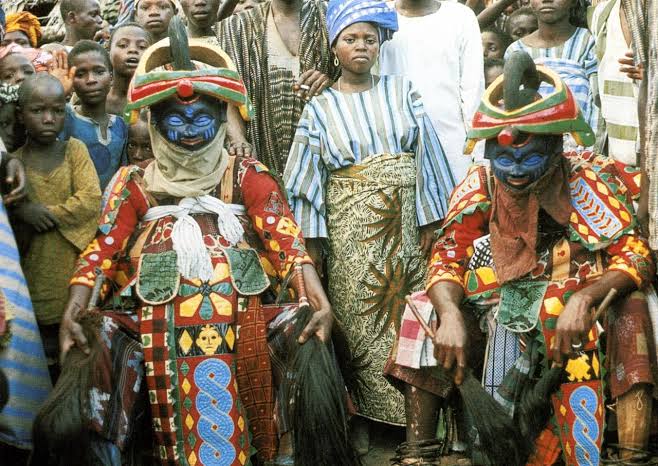Allah is Not Obliged is a socio-political novel that reflects the internal strifes in two West African countries. The novel, written by Ahmadou Kourouma, projects the ruination of a country’s socio-economic life, the ruination of childhood innocence, the tearing away of families, and other devastating effects of war.
It relates the role each actor in the Sierra Leonean and Liberian crises played, identifying “greed”, “lust for power”, “perpetuation in power”, “tribalism”, and “exploitation” as the causes of these needless wars.
Here examined are some of the themes in the novel. Notable themes in Allah is Not Obliged include superstition, war, power instability, religion manipulation, juvenile corruption, child-soldier phenomenon, cannibalism, and distorted fatalism.
Superstition
Allah is Not Obliged is replete with superstitions. We see in the novel the validation of speculations, conspiracy theories, and myths as truths. There are many instances of superstition in the novel.
Birahima’s mother, Bafitini (otherwise known as Maman) is a victim of superstitions. Her condition basically worsened because of superstitions.
Her leg, for example, generates a lot of myths. At some point in time, she is said to have been cursed. At another, she is held responsible for her rotting leg. She is alleged of being a powerful witch who licks her wound in spirit to stay fresh. She is even rumoured to derive power from the wound.
The reason for her rotting leg is steeped in superstition. Between her and a healthy life lies a simple medical cure. She would have been healed if her faulted leg had been amputated. But her people are advised against this medical solution by an equally ignorant and superstitious hospital official. They secretly smuggle her out of the hospital before the slated day of operation. And Bafitini has to live with an infected rotting leg for the rest of her life. She drags herself on her buttocks in familiar putrid smell which has now become an inseparable part of her existence.
There is also the superstition about the dreadful and vengeful spirits of twins. It is assumed that when one hurts twins, their gnamas or spirits would avenge them and haunt the hurter. So, when Fati, a child-soldier, hurts little twins, it is hastily concluded that she is done for.
The gnamas of twins, especially when they’re still kids, are terrifying. (Gnamas are the shadows, the avenging spirits of the dead.) Gnamas like that never forgive . . . . Fati would be forever hunted by gnamas, the gnamas of little twins . . . .
Allah is Not Obliged
Fati believes she is cursed; that she is going to die a terrible death as a retribution for what she has done to the little twins. She thinks she is finished.
The Ghanaian writer, Amma Darko, is perhaps right when she wrote in her novel, Faceless, that “when the seed of a curse finds fertile ground in a human mind, it spreads with the destructive speed of a creeping plant. And while it does, it nurtures superstition, which in turn eats into all reasoning abilities and the capability of facing responsibilities.”
Another prominent superstitious belief in the novel is the potency of charms, otherwise known as grigis, to disarm bullets. These grigis are meant to be bullet deflectors. The likes of Yacouba and his friend, Sekou, make fortunes out of people’s reliance on grigis as some sort of bulletproof. Even when they have not the least clue on how these things work, they make grigis to shield soldiers from harm in battlefields.
Soldiers, despite being fortified with grigis, fall in battles. This defeats the purpose of the grigis and shows in effect the impotency of these charms.
When some child-soldiers die in a confrontation and the grigrimen are challenged on the effectiveness of their charms, the charm makers claim the child-soldiers do not keep the rules that bind the potency of the grigis. This kind of justification for the impotency of their charms puts the grigrimen in the right always.
That people believe some grigis are bullet deflectors baffles and does not appeal to reason. Only Birahima and a few others are a bit skeptical about the potency of the bullet deflecting grigis.
War
The novel explores the theme of war. Much of the narrative is about the internal conflicts in two West African countries, Liberia and Sierra Leone. The novel runs insightful commentary on the roles each active warlord played in the escalation of the crises, what they harp on to fuel the wars, and the concomitant effects of the war on the people.
The narrator, Birahima, goes in search of his aunt in one of the troubled countries, Sierra Leone, after the death of his mother. Before he could reach the subject of his quest, he finds himself entangled in the ongoing war and also becomes a child-soldier.
The civil wars in both countries are fueled by power tussle, insensitivity and tribalism. The novel projects the destructive power of wars, the deaths, lawlessness, and the hobbesian chaos that accompanies wars. The novel casts insight into the exploitation, hunger, desecration of norms, and the mindless killings found in war situations.
The novel apposes historical references alongside Birahima’s narrative. It spells out the involvement of historical references like Prince Johnson, Charles Taylor, Samuel Doe, Thomas Quionkpa, Johnny Koroma among others in the bloodletting wars. The conflicts of interest of a few individuals almost brought the two countries into ruination. Like elsewhere, the embers of the civil wars are fanned by ethnic prejudice, dominance, and suspicions.
Power Instability
The atmosphere in the novel is tensed and there is a general instability in the novel. None of the warring parties have absolute control. Much often, power on who calls the shots switches hands just the same way Birahima and Yacouba susbsist on changing sides as they progress in their journey.
The two wars are politically motivated. They are generally about who has what power — battles of political egos which cost everyone an arm and a leg. This political instability that pervades the novel inflects Yacouba’s and Birahima’s decision on who to align with, when, and how.
Religion Manipulation
A key feature of Allah is Not Obliged is religion manipulation. Characters manoeuvre round religion precepts to suit their own interests. Lies marketed on the platform of religion are easily acknowledged as truths.
To start with Colonel Papa le Bon, he is a Western trained priest. Finding himself in a war-ravaged Sierra Leone, he stays to salvage the mess and propagate the Lord’s message. By choosing to stay, he kills, maims, sleeps with women, brandishes occult practices side by side with Christianity, and raises an army of potentially dangerous child-soldiers. That he does these under the aegis of Christianity impresses upon his followers a distorted view of the religion.
Prince Johnson of Liberia, as projected in the novel, is another example of a man who manipulates the precepts of religion to suit his interest. He claims to have had a prophecy from the Lord that no military leader should take over the rulership of the country. This, we find out, is just a ploy for him to stay relevant in the pursuit of power. He and his cohorts orchestrate the death of the equally vicious but somewhat repentant Samuel Doe. Again, Johnson claims it is the Lord’s justice. He claims Doe is chief among the devil’s men when he is no way different in conduct and actions from Doe.
Sadly, many of these double-faced self-styled religion warlords command a blind following who are intoxicated by the opium of religion their leaders feed them on.
We see through these instances the vulnerability of religion in the manipulative arms of self-serving self-styled deputies of God.
Juvenile Corruption
A war situation is an ideal atmosphere for the orchestration of all forms of ills and vices and unthinkable acts. As we find out in the novel, war makes adults out of children. The sick children in such situation have to make adult decisions, fend for themselves, defend themselves and are vulnerable to exploitation. They find themselves indulging in all sorts of unthinkable acts; things that would alter the rest of their lives; that would haunt them for a long while.
War exposes child-soldiers like Birahima and Kik to killings and cannibalism. It corrupts their innocence forever and gives them a perverted worldview of things. In the case of Birahima, it exposes him to sexual exploitation. He writes of how Colonel Baclay’s wife, Rita Baclay, abuses him sexually:
And after I finished eating, she always asked me to take off my clothes. And I would. She would stroke my bangala gently, gently, and I’d get a hard-on like a donkey . . . . She would kiss my bangala over and over and then she’d swallow it, like a snake swallowing a rat. She used my bangala like a toothpick.
Allah is Not Obliged
Birahima, exploited here, finds the act pleasuring and is bound to grow into a sexual exploiter too like Rita Baclay and Colonel Papa le Bon.
Balla, Bafitini’s healer and later Birahima’s step-father, has a negative influence on Birahima such that Birahima’s grandmother does not approve of the things Balla teaches Birahima. Birahima himself credits Balla for teaching him a lot of expletives:
All the stuff I bullshit about (‘bullshit’ means ‘to say stupid things’), I learned from Balla.
Allah is Not Obliged
Birahima’s life as a street kid corrupts him further. So, Birahima leaves home for Sierra Leone someone whose childhood has been corrupted already. It is only natural in war circumstances he longs to be a child-soldier.
War no doubt exposes children to tense situation whose adverse effects even adults have to grapple with.
Child-soldier Phenomenon
During the civil wars in Sierra Leone and Liberia, children are brought into the picture. Children are drafted into the different factions in the war. They are given guns, kalashes within the context of the novel, and donned in oversized military camouflages to kill. They are turned into war-machines causing destruction.
It is not as if they have a choice. It is the only way to survive. Birahima and several other kids in the novel typified the child soldiers who fought and died in the wars.
Birahima has this to say in the opening chapter of the novel about what being a child soldier means:
I’ve been in Liberia and killed lots of guys with an AK-47 (we called it a ‘kalash’) and got fucked-up on karif and lots of hard drugs.
Allah is Not Obliged
In another part of the same chapter, he writes:
And I killed lots of innocent victims over in Liberia and Sierra Leone where I was a child doing tribal warfare, and where I got fucked-up on lots of hard drugs. The gnamas of the innocent people I killed are stalking me, so my whole life and everything round me is fucked.
Allah is Not Obliged
He insinuates from the above excerpt that child-soldiers are commissioned to kill. The survivors among them are forever haunted by the memories of their gory past.
We also see in the second chapter of the text what becomes of the non-survivors, the war casualties:
Kik had stepped on a mine. It was a terrible sight. Kik was screaming like a suckling calf, like a stuck pig. He was screaming for his mum, for his dad, for all and everyone. His leg was in bloody shreds and hanging by a thread.
Allah is Not Obliged
The narrator goes further to describe the pitiable circumstances that surround each child-soldier’s story. Through his funeral orations of fallen child-soldiers, Birahima exposes why the children sometimes submit themselves for conscription. There is a particular excerpt that sums up the rationale behind their forced choices:
When you haven’t got no father, no mother, no brothers, no sisters, no aunts, no uncles, when you haven’t got nothing at all, the best thing to do is become a child-soldier. Being a child-soldier is for kids who’ve got fuck all left on earth or Allah’s heaven.
Allah is Not Obliged
Cannibalism
The theme of cannibalism is graphically expressed in words in the text. Cannibalism is the act of eating another of one’s own species. Within the context of this novel, cannibalism entails the eating of humans by their fellow human beings for occult reasons.
For the soldiers in Allah is Not Obliged, it is not enough to have staked human skulls as prized possessions. They also go extra length to drink human blood and eat human flesh — a repulsive act which for them reinforces their spiritual powers and fortifies them with strong bullet deflectors. Birahima describes this abnormality and the general conception of it in tribal wars:
In tribal wars, a little human meat is necessary. It makes the heart hard, very hard, and protects against bullets. The best protection against whistling bullets is probably a piece of human meat. for example, I, Tieffi never go to the front, never go to battle without a calabash (a bowl) of human blood. A calabash of human blood makes you strong, makes you fierce, makes you cruel, and protects you from whistling bullets.
Allah is Not Obliged
The above excerpt of course reflects not only Tieffi’s habitual practice. It measures how degenerated this society is.
In the words of Wole Soyinka, “art should expose, reflect, and indeed magnify the decadence, rotted underbelly of a society that has lost its direction.” In Allah is Not Obliged is a decadent rotted society that has lost its direction and the humaneness that is the essence of every human being.
Samuel Doe’s decapitation by Prince Johnson and his henchmen projects the theme of cannibalism. Doe’s fingers are cut off and his heart is roasted into a kebab. One of Johnson’s men eats Doe’s flesh to “make himself look more cruel, more brutal, more barbarous and inhuman.”
Even primordial humans would have conducted themselves better than the superstitious cannibals portrayed in this novel.
Distorted Fatalism
Wiktionary defines fatalism as “the doctrine that all events are subject to fate or inevitable necessity or determined in advance in such a way that human beings cannot change them.”
In the history of literary analysis, there has been at one time or the other discourses on which of fatalism or free will takes precedence. Works like Christopher Marlowe’s The Tragical History of the Life and Death of Doctor Faustus beggars the question: “which of fate or free will decides what happens to humans?” The submission I align with is that there is the place of free will and the place of fatalism. It is in man’s inherent nature to choose between right and wrong, good or bad. The moment Doctor Faustus chooses to sell his soul to Lucifer for a paltry date with magic, his eternal damnation is already sealed.
In Ahmadou Kourouma’s Allah is Not Obliged, there is a wrong understanding of fatalism. This misconception is of course not unconnected with the characters’ will to absolve themselves of blames.
Bafitini’s rotting leg is attributed as Allah’s doing. Kik’s death is ascribed to Allah. Killings and deaths in the novel are taken from the perspective of fate — that Allah fated them to be so. Looking beyond the veil of faith, one can conveniently say many of these tragic events are human-inspired. Human beings, not Allah, bring misery and hardship on their fellow human beings.
Bafitini’s condition, for example, is worsened by her ill-advised secret withdrawal from the hospital where the problematic leg is meant to be amputated. If that leg had been amputated, she wouldn’t have had to undergo the pain and smell she had to, or be a perpetual subject of minted myths, or have to watch her son become a street kid while she’s helpless to effect any change.
Captain Kik’s mine accident is justified with “that’s how Allah decided he wanted poor Kik to end his days on earth” sentence. This again is a distorted view of fatalism. Allah did not in any way start the civil wars. Man, in his lust for power and the fight to perpetuate himself in power, started this war.
The tragic incidences in the novel are justified severally with the fact that Allah is not particularly fair about the things he does on earth. This is doctored to fit in with the Islamic precept that Allah’s system is particularly fair and strict in heaven but somewhat loose on earth and not necessarily fair. Heaven in this context is meant to be a reward for one’s deeds on earth: ones with good deeds are allotted spaces in the Paradise and the ones with bad deeds find their places in the Hell.
This justification is found in the following excerpts:
“ . . . the Almighty up in heaven doesn’t give a shit and does whatever he wants, and he doesn’t have to be fair about everything he decides to do here on earth.”
“Allah is not obliged to be fair about everything, about all his creations, about all his actions here on earth.”
“They died because that’s how Allah wanted things. And Allah is not obliged to be fair about everything he does.”
 WHATSAPP: Click HERE to join the new Literature PADI WhatsApp group to receive latest updates on your phone and for further literary discussions!
WHATSAPP: Click HERE to join the new Literature PADI WhatsApp group to receive latest updates on your phone and for further literary discussions!










